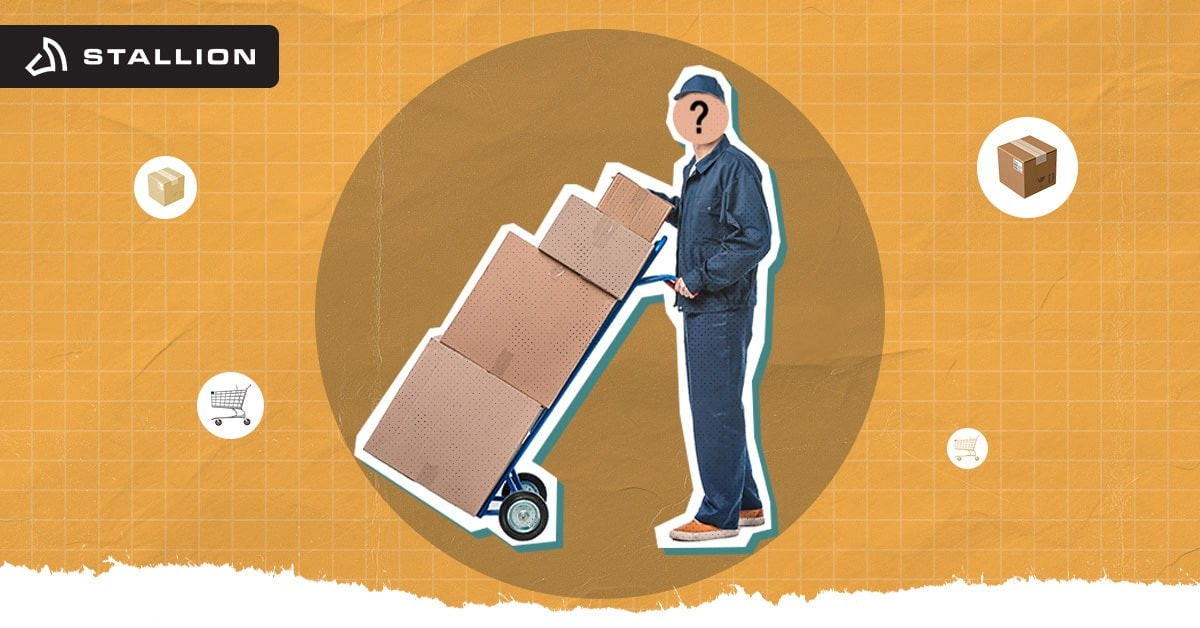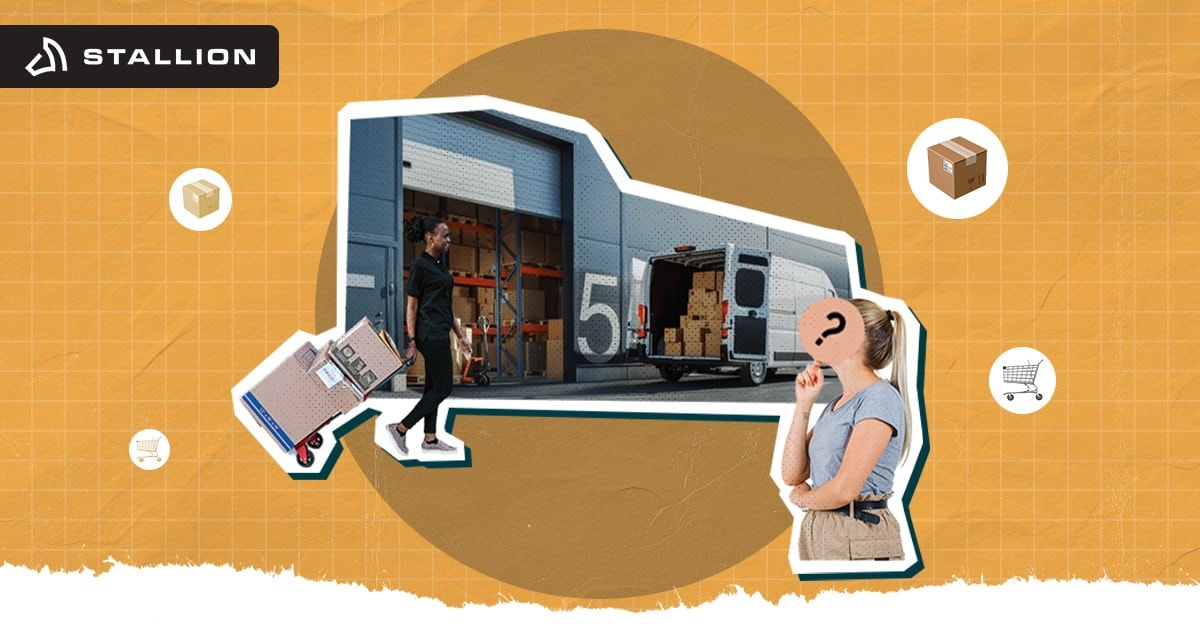Stallion 3PL fulfillment is here! Learn more
Clothes are some of the top items that people buy. If you’re running an apparel business, knowing how to ship clothes correctly is essential. It will help you make your brand more presentable. After all, it speaks about how you handle your products.
So, if you want to know the best ways to ship apparel, you got the right post! In this guide, we’ll walk you through everything you need to know to ensure your customers receive your products in the best condition. Now, let’s dive in and streamline your apparel shipping process!
Shipping clothes can be a little tedious because you need to make sure everything is good. However, the tiresome feeling is nothing compared to the smiles on your customers’ faces when they receive their packages in perfect condition.
Here are the steps you need to remember when shipping clothes to your customers:

The first step in shipping clothing is preparing the items. This involves checking each item for defects or damage.
It’s also crucial to ensure you’re preparing the right size and colour as indicated in your customer’s order. Sending an incorrect item can only frustrate and disappoint your customers. These are the situations that you want to avoid as much as possible!
Now, remember that packing clothes does not only mean directly putting them into a box. It would help if you also pack them correctly according to their category.
Here’s a quick breakdown of how you should package clothes for shipping:

Choosing the suitable packaging materials when preparing your packages makes all the difference when shipping clothes.
Doing so ensures that your clothing products are in excellent condition. This creates a positive impression on your brand. Well, imagine receiving a wrinkled shirt in a flimsy package. It doesn’t scream professionalism, right?
Also, investing in good quality packing material, like Stallion’s shipping supplies, not only protects your items from damage during transit. It also enhances the unboxing experience for your customers, leaving them impressed and eager to shop at your brand again.
Follow these tips on how to choose the right packaging materials for your clothing products:
So, just like your customers carefully select the proper clothing for their style, take the time to choose the best packing materials for your products. This small detail makes a lasting impression on your clothing brand’s reputation.
Adding protective padding like bubble wrap or garment paper ensures that your customers receive their purchases in perfect shape.
Think about it: nobody wants to receive a package only to find their favourite shirt squished or torn due to rough handling during shipping.
Just like we’d want our items handled carefully, ensuring clothes are packed with adequate protection is essential to maintain their pristine condition.

Attaching complete and accurate labels when shipping clothes to customers is important for several reasons:
Ultimately, a well-labelled package reflects professionalism and reliability. Especially for starting online clothing stores, this helps build customer trust and loyalty, which are essential for long-term success in the competitive business landscape.
Selecting the right shipping method for your clothing deliveries helps you achieve customer satisfaction and maintain a positive reputation.
Your shipping methods will impact delivery time, shipping costs, and overall customer experience.
By choosing reliable and efficient shipping services, you can guarantee that your customers will receive their orders in a timely manner. In return, this minimizes the risk of delays or lost packages.
Here are a few pro tips when selecting the best shipping method for your online clothing store:
To do this, look at previous customer reviews and feedback. Beyond the shipping carrier’s branding, these testimonials will also give you a glimpse into what you may experience when shipping with a particular carrier.

Tracking shipments ensures a smooth and transparent delivery process. By monitoring the shipment’s progress in real time, you can proactively address any potential delays or issues that may arise during transit.
Additionally, this feature provides the specifics of delivery, which helps customers anticipate the arrival of their orders or plan accordingly.
This level of transparency builds trust and confidence in the business, enhancing the overall customer experience. Lastly, tracking shipments allows you to intervene promptly in case of lost or damaged packages.
For example, imagine you shipped a batch of clothing orders to customers using a specific shipping provider. After a few days, you noticed through the tracking details that one of the packages had been stuck at a sorting facility for an extended period.
You can contact the shipping carrier’s customer support using the tracking information to inquire about the shipment status.
Knowing the situation lets you provide clear details when your customer asks about their package. Doing this helps you address potential problems, maintain customer satisfaction, and keep your brand reputation.
By confirming delivery, you prepare yourself in case of disputes or claims of non-delivery from customers. It provides a sense of closure to the transaction, assuring both sides that the order has reached its destination safely and on time.
Additionally, this feature helps you track shipment progress accurately and promptly address any issues that may arise during transit, such as lost or damaged packages.
A few ways to confirm delivery with your customers include:
Overall, confirming delivery is a simple yet essential step in ensuring a smooth and reliable shipping process for clothing orders.
The cost of shipping clothes can vary depending on several factors, like:
Packaging materials and handling fees may also contribute to the shipping cost. To determine the precise cost of shipping clothes, it’s best to compare rates among Canada’s major shipping carriers and consider the specific requirements of each shipment.
If you’re shipping clothes internationally, here’s a table you can use to compare Canada’s top shipping providers and their international shipping options, speed, and costs.
Note that the shipping cost estimates below are based on the following details:
Item Category: Women’s Apparel
Item Description: Leather Jacket
Item Value: 75 CAD
Package Weight: 1.8 kg / 4 lbs
Package Dimensions: 15 x 10 x 8 inches
Place of Origin: Ontario, Canada
Package Destination: Marseille, France
| Shipping Carrier | Shipping Options | Shipping Costs | Delivery Timeframe |
Stallion | Via PostNL International Packet Untracked | 33.73 CAD | 4-11 business days |
| Via APC Priority Worldwide Untracked | 36.10 CAD | 4-21 business days | |
| Via PostNL International Packet Tracked | 36.18 CAD | 7-11 business days | |
| Via APC Priority Worldwide Tracked | 37.41 CAD | 12-16 business days | |
| Via APC Priority Worldwide Tracked (DDP) | 38.93 CAD | 8-12 business days | |
Purolator | Purolator Express International Guaranteed | 260.72 CAD | 2 business days |
| Purolator Express International 12 PM Guaranteed | 274.52 CAD | 2 business days | |
UPS Canada | UPS Worldwide Expedited | 213.30 CAD | 10-11 business days |
| UPS Express Saver | 227.60 CAD | 3-4 business days | |
| UPS Worldwide Express | 239.51 CAD | 3 business days | |
FedEx Canada | FedEx International Connect Plus | 184.10 CAD | 10 business days(10:00 PM) |
| FedEx International Economy | 193.78 CAD | 10 business days(6:00 PM) | |
| FedEx International Priority | 253.10 CAD | 3 business days (6:00 PM) | |
| FedEx International Priority Express | 265.24 CAD | 3 business days(12:00 PM) |
(Note: Refer to the shipping carrier’s website for the latest and more accurate shipping cost estimates.)

As seen in the table above, Stallion offers the cheapest rates when shipping clothes internationally. This Canadian e-commerce shipping service provider provides a reasonable delivery time frame from Canada to other countries.
Stallion keeps stepping up the game when it comes to providing international shipping services. We aim to help more Canadian online sellers grow their market by reaching more countries than ever.
By working with reliable shipping couriers like APC Logistics and PostNL, we ensure you get an industry-leading international shipping service for the lowest rates! With us, you can save up to 80% in shipping worldwide with full tracking options and unbeatable delivery time.
Let Stallion help you reach your customers anywhere in the world and style them up with your fashionable apparel! So, create your Stallion account today and kickstart your online store’s journey to the global stage.
Mastering the art of shipping shirts and other fashion pieces is more than just getting products from point A to point B. It also delivers an experience reflecting your clothing brand’s commitment to quality and customer satisfaction. So, remember to put this blog’s insights into action.
To make it even better, ship clothing with Stallion and watch your apparel business thrive internationally.


